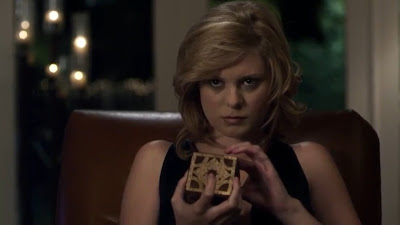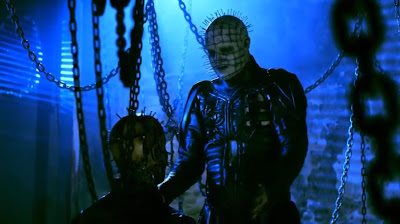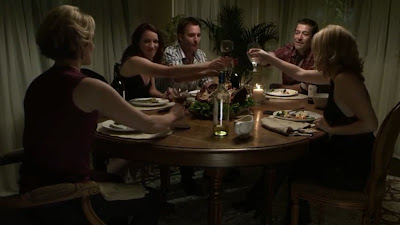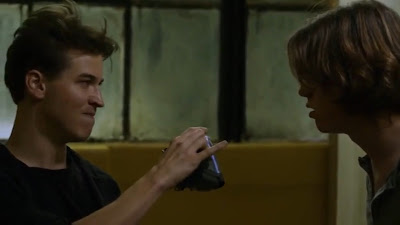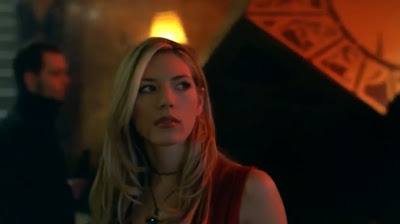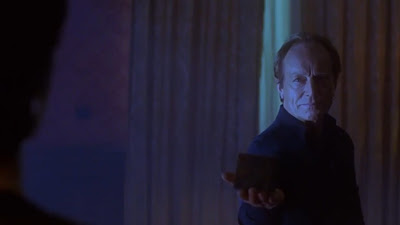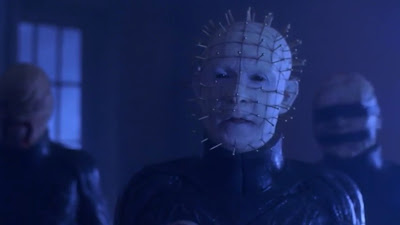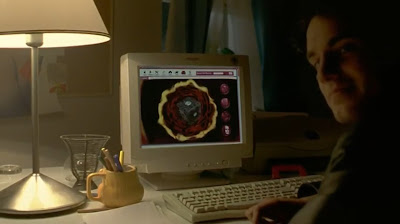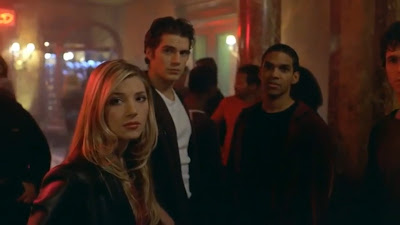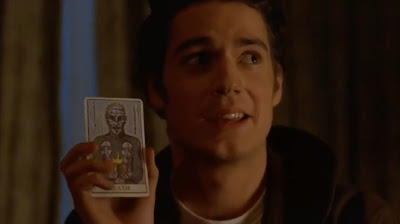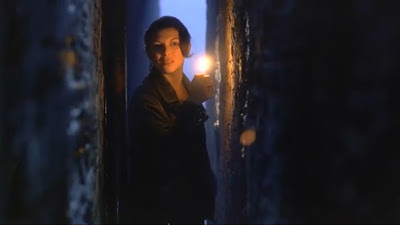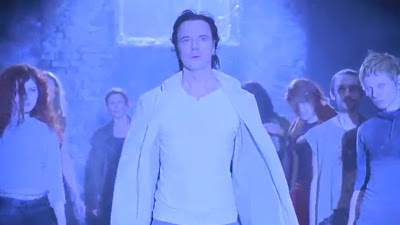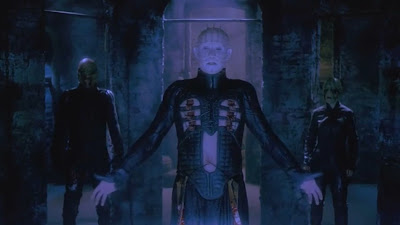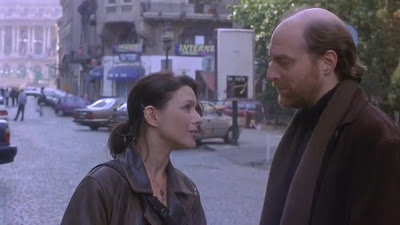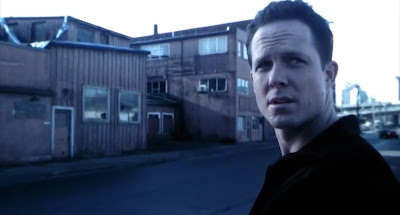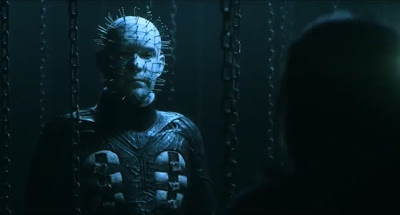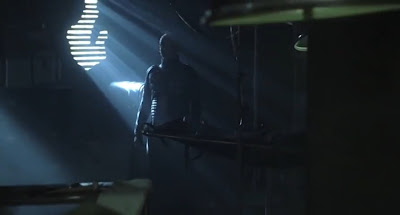 |
| The Hell Priest (Jamie Clayton) torments a victim. |
Release Date: Sept. 28, 2022. Running Time: 121 minutes. Screenplay by: Ben Collins, Luke Piotrowski. Story by: David S. Goyer, Ben Collins, Luke Piotrowski. Directed by: David Bruckner. Produced by: David S. Goyer, Keith Levine, Clive Barker, Marc Toberoff.
THE PLOT:
Riley (Odessa A'zion) is a recovering alcoholic and drug addict. She's staying with her brother, Matt (Brandon Flynn), his boyfriend, Colin (Adam Faison), and their roommate, Nora (Aoife Hinds) while working a dead-end job and dreaming of better things. In short, the perfect setup for a sitcom.
At least, until Trevor (Drew Starkey), whom she met in a twelve-step program, offers an opportunity for some easy money by breaking into an abandoned warehouse. They're hoping for gold bars or bonds. What they find is a puzzle box, which captures Riley's attention enough for her to bring it home with her.
After an argument with Matt drives her out of the apartment, Riley relapses with some pills, opens the box, and sees a vision of demons. Then her brother comes to rescue her. He cuts his hand on a secret blade in the puzzle box, only to disappear immediately after... and Riley sees the box change shape with his disappearance.
Riley connects the box to Roland Voight (Goran Višnjić), a wealthy businessman who disappeared six years earlier. She goes to his now derelict mansion and finds Voight's journal, which describes the box and its six configurations, which move from the initial cube-like Lament Configuration all the way to its final form, the Leviathan Configuration, which grants the user an audience with "God."
Riley believes that if she can solve the puzzle, she can get her brother back. But each of the box's configurations requires a new blood sacrifice. She still has three steps left to get her wish - but the price may be too high!
 |
| Riley (Odessa A'zion) and her friends are hunted by the Cenobites. |
CHARACTERS:
Riley: The Riley we first meet is selfish, defensive, and more than a little belligerent - a fair characterization for an addict but not necessarily one that encourages viewers to want to spend time with her. We see enough of her daily life to know that she relies heavily on her brother. When the Cenobites begin stalking her and her friends, her first impulse is to say that Matt would know what to do (unlikely). She gradually emerges as a leader in her own right, keeping the group moving toward the relative safety of Voight's house and hatching a plan to try to save them, even as she still hopes to somehow get her brother back.
Colin: The boyfriend of Riley's brother, who is emotionally supportive to both of them. When Matt gets angry and kicks Riley out, Colin urges her to stay, insisting that this is just a bad night and that things will be better in the morning. Matt's disappearance has to be affecting him too, but he only truly lets that show in the immediate aftermath before setting his feelings aside to try to help Riley. True, his initial worries are more about her relapsing than about running into literal creatures from hell - but even when the demons appear, he manages to keep it together better than almost anyone would.
Trevor: Riley's new boyfriend, who kicks off this situation when he leads her to the puzzle box. After Matt disappears, he tries to take the box away from Riley, which she sees as a betrayal. When they come to find her in the second half, he and Colin fall to arguing almost immediately, leaving it to Riley to keep them both focused on the immediate problem.
Nora: Matt and Colin's roommate, Nora seems like an entirely decent person. She's not above teasing her friends, casually and visibly eavesdropping when Matt and Riley argue, but she's also ready to drop everything to help when needed. At Voight's house, when Trevor starts to pour a drink, she lightly reproves him for it: "We don't drink when Riley's around."
Matt: Riley's brother, whose disappearance motivates her actions for the rest of the movie. He behaves almost like her father, trying to set rules and boundaries that she inevitably kicks against. He kicks her out, only for the initial anger to fade, at which point his guilt leads him out to search for her. When he finds her in a stupor, he focuses on getting help for her, even when he cuts his hand - quite badly - on the puzzle box.
Voight: Goran Višnjić, as the occult-obsessed billionaire, grants considerable screen presence. His Voight conveys complete self-interest. "I get what I want!" he declares defiantly, treating dealings with demons as if he's in the midst of a real estate transaction. He cares nothing about others, and the movie opens with him tricking a young man (Kit Clarke) into solving the puzzle box so that he can sacrifice him for a wish. You don't have to have seen any of the other Hellraiser films to guess that Voight gets his wish, but not in the way that he'd have preferred.
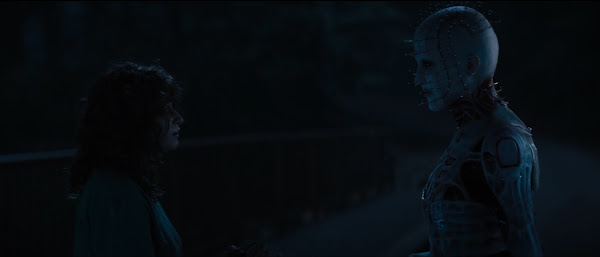 |
| "We want you to proceed." Pinhead urges Riley to continue solving the puzzle. |
JAMIE CLAYTON AS PINHEAD:
"What is it you pray for? ...What would it feel like? A joyful note, without change, without end? Heaven? There's no music in that... There is so much more the body can be made to feel - and you'll feel it all before we're through."
This film bills Pinhead simply as "The Priest," because co-producer Clive Baker, author of the original novella and writer/director of the original film, hated the "Pinhead" nickname. Nice try, Mr. Barker, but I'm pretty sure everyone will continue referring to the character as Pinhead.
The book describes the Hell Priest as having no gender and a feminine voice, something Jamie Clayton conveys. The heavy costume severely restricted Clayton's movements. This has the same effect as it did on Doug Bradley's initial performance, with the stillness and rigid posture granting a formality to every step and gesture. Also like Bradley in the first film (far less so in the sequels), Pinhead doesn't threaten; she teases and promises, and you are best advised to avoid receiving any of her "gifts."
Though Clayton is more book accurate, I'm not remotely saying that she's better than Doug Bradley. Bradley's Pinhead is a horror icon. At his best, he was mesmerizing, alternating between anger and amusement, between impatience and weariness, often with just the tiniest shift of tone. Still, Clayton's a reasonably close second, and I would not in any way object to more films featuring this version of the character.
 |
| Riley stares at the puzzle box's newest configuration. |
THOUGHTS:
David Bruckner's 2022 Hellraiser reboot is the first entry since Bloodline to have official involvement from Clive Barker. It's probably no coincidence that it's also the best film in the series since the first two, and probably the best since the 1987 original.
That said, and as fond as I am of the early Hellraiser movies... This doesn't exactly clear a formidably high bar. The first movie remains excellent even decades later. Other entries are "flawed but ambitious," while the rest range from mediocre to downright awful.
WHAT DOESN'T WORK:
Hellraiser (2022) is a reboot, so it's fair enough that it changes some of the lore. A few of those changes are ones that I like... but I don't like Cenobites claiming innocent victims. "It is not hands that call us" is a lot more interesting - though, in fairness, after the first two films, the original series deviated from that principle more often than it stuck to it.
The movie's biggest problem is its length. The story here would make for a really good 100-minute horror flick. At 121 minutes, it feels overstretched. The plot doesn't properly kick into gear until Riley reaches Voight's estate, and that doesn't happen until the 50-minute mark. It gets rather good at that point and stays good through the end - but I did a fair amount of seat-shifting before then, with the first half hour coming distressingly close to boring me.
This would be fine if that time had been used to build memorable characters. Except for Riley, the members of the core group are as two-dimensional as the supporting casts of the direct-to-video entries. They never move beyond their initial descriptors: Brother, Boyfriend, Brother's Boyfriend, Roommate.
There's a memorable kill scene at the halfway mark in which one of the group is left to Pinhead's nonexistent mercy. Everything about the scene works: the victim's terror, Pinhead's speech, the ghastly cleverness to Pinhead's act and how that act ties in with her words. It's a great horror movie bit, disturbing and gripping all at the same moment - and if I had actually cared about the victim, it would have been truly unforgettable.
 |
| Voight's estate is a puzzle box in its own right. |
WHAT WORKS, AND OFTEN QUITE WELL:
This film makes good use of the idea of the puzzle, something that was entirely lost in the earlier sequels. Each new configuration requires effort, and the progression from one shape to the next provides a goal beyond merely opening it. The individual bits of the box rotate, with shifting patterns according to those manipulations. Voight's is a puzzle box in its own right. It's surrounded by metal gates and doors that open and close with the flip of switches. The landscape shifts in ways that resemble the shifts of the box, an ominous visual to herald the demons' arrival and a terrific visual echo.
Riley is an addict, and her use of the box echoes facets of addiction. In narrative terms, the puzzle box is Riley's only hope of getting her brother back. It also works as a stand-in for her addiction. As Voight demonstrated, the box's promise is much like a drug's promise of satisfaction - a lie, a trick. There's no way to "win," and the Cenobites' gifts will not please those who receive them. But when the others try to get her to see this, she lashes out, even snapping at Trevor for betraying her when he tries to take it from her. Whether Matt even can get his resurrection or not is questionable. What's not in question is that Riley's fixation threatens to destroy not only her, but also the people who came to help her.
Though the first half is too slow, patient viewers will be rewarded with a strong second half. The barrier surrounding Voight's house allows the characters to get to something approximating safety, which allows them to think, react, and plan. But they are also under siege from that moment, with the Cenobites waiting outside: patient and unmoving as they await the blood that is their due. It's a situation well-suited to building tension.
I also quite like the ending. I won't discuss it, because I don't want to risk spoiling it for anyone who hasn't seen the movie. But it's an excellent finale in terms of both story and theme, and I found it vastly more satisfying than a "Final Girl" manipulating the box and shouting, "Go to hell!" at Pinhead.
 |
| Riley confronts the Cenobites. |
OVERALL:
Hellraiser (2022) is a good movie on its own terms, and it's exactly the resurrection that this series needed after years in the low budget direct-to-video graveyard. It has its issues, notably a painfully slow start and a bland supporting cast. It's clear watching it, however, that thought and effort went into its making.
There's room for improvement. But for the first time in a long time, I find myself hoping that there will be another Hellraiser. If another movie refined and built on the elements that worked, and rejected the ones that didn't, I think the result might be something special.
Overall Rating: 7/10.
Previous Movie: Hellraiser - Judgment
Review Index
To receive new review updates, follow me:
On Twitter:
On Threads:





